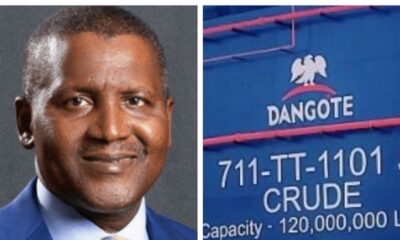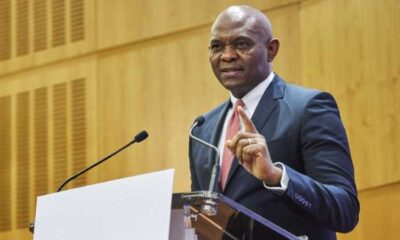The Nation
FG enlists Dangote, Otedola, Elumelu in new effort to combat Malaria

In a significant move to tackle the persistent issue of malaria in Nigeria, the Federal Government has appointed three of the nation’s most prominent business leaders: Aliko Dangote, Femi Otedola, and Tony Elumelu to spearhead a renewed effort aimed at eliminating the disease.
This initiative was announced during the inauguration of the Nigeria End Malaria Council (NEMC) in Abuja over the weekend.
Minister of State for Health and Social Welfare, Dr. Tunji Alausa, highlighted the severity of the malaria crisis in Nigeria, noting that the country accounts for over a quarter of global malaria cases and approximately one-third of the more than 600,000 annual malaria deaths worldwide. The majority of these deaths occur among children and pregnant women.
Dr. Alausa described the situation as “sad” and pointed out that malaria contributes to 25-30% of childhood mortality and accounts for about 60% of hospital visits in the country.
Additionally, the disease is a leading cause of absenteeism in schools, markets, and workplaces, creating significant financial burdens for Nigerian households.
Aliko Dangote, Chairman of the Dangote Group; Femi Otedola, Chairman of FBN Holdings Plc and Geregu Power Plc; and Tony Elumelu, Chairman of UBA Group and founder of Heirs Holdings, will collaborate with key stakeholders, including the Nigerian Governors’ Forum, the National Assembly joint health committees, and various women’s organizations, to drive this ambitious effort.
“It gives me great pleasure to be present in this auspicious meeting whose major objective is to contribute to a reduction in the malaria burden and possibly the elimination of malaria in Nigeria, which will ultimately lead to the improvement in the quality of lives of all Nigerians.
“It is no longer news that Nigeria contributes more than a quarter of global malaria cases and about a third of the over 600,000 deaths, mostly among children and pregnant women.
”It is sad to note that malaria contributes about 25-30 per cent childhood mortality and about 60 per cent hospital attendance. Similarly, malaria is a major cause of absenteeism in schools, markets and workplaces, as well as a major out of pocket spending for most households in the country,” Alausa stated.
The minister noted that it was common knowledge that Nigeria which currently has a population of over 200 million has its entire population at risk of malaria, a situation that puts a huge challenge on the government.
He lamented that the implementation of the various interventions such as provision of antimalarial medicines, protective interventions such as chemo-preventive treatments as well as treated nets and insecticides for indoor and outdoor spraying had remained inadequate to meet the targeted population.
“While malaria cases and deaths are shrinking in other countries, Nigeria has continuously recorded higher number of cases. Bulk of the support for the interventions are donor-driven, hence inadequate and not sustainable.
“Aware of the fact that no country ever eliminated malaria through donor supports, the African Heads of States launched the African Leaders Malaria Alliance (ALMA) during the African Union Summit of 2009 and the Malaria Scorecard was developed in 2011 to monitor the country’s performance and also, to be used as an advocacy tool for heads of Government,” the minister added.
According to him, the council was established in 2017 and was inaugurated by former President Muhammadu Buhari on August 16, 2022, stressing that the inaugural meeting was long overdue.
He stated that the setting up of the End Malaria Council was to advocate malaria to remain high on the national and state agendas through strong political commitment from leaders at all levels, mobilise financial and in-kind resources from new sources, including the private sector to help close resource gaps in the national malaria strategic plan.
“By reason of your positions in Nigeria, your passion towards health issues, especially malaria, and the interest groups you represent, your membership to this council is inevitable for the benefit of the larger society, and especially children and pregnant women who are the most affected and would remain forever grateful,” he added.
As part of the event, the minister handed over the leadership of the council to Dangote, who has served as Nigeria’s Malaria Ambassador as well as a member of the Global End Malaria Council.
Speaking at the meeting, Dangote urged the members to tackle malaria head-on, highlighting members’ collective strength across government, civil society, religion, and business as well as their unique ability to mobilise resources for the national malaria programme.
Besides, he outlined the council’s primary objectives of ensuring that malaria elimination remained high on Nigeria’s agenda, noting that it is possible with strong political commitment from leaders at all levels, and advocacy at both the national and state levels to secure sufficient funding.
Dangote urged the council to be alive to its responsibility of protecting the progress made so far, sustaining it, and ensuring that the country is on an irreversible pathway to ending malaria.
He added: “I want to appreciate your acceptance to serve our beloved country in this capacity, and I am glad to join hands with you to reduce the burden and deaths due to malaria in Nigeria.”
Council members are expected to mobilise funds needed to ensure that the malaria scourge is eliminated in the country.
Also, the Nigeria end malaria council secretariat, led by its Executive Secretary, Mr Ope Abegunde, was handed over to the council.

































